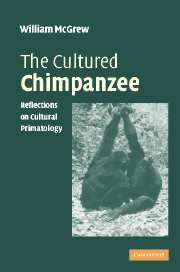Book contents
- Frontmatter
- Contents
- Preface
- Acknowledgements
- 1 Introduction
- 2 Definition
- 3 Disciplines
- 4 Creatures other than primates
- 5 Primates
- 6 Chimpanzee ethnography
- 7 Chimpanzee material culture
- 8 Chimpanzee society
- 9 Lessons from cultural primatology
- 10 Does cultural primatology have a future?
- References
- Author index
- Subject index
9 - Lessons from cultural primatology
Published online by Cambridge University Press: 29 December 2009
- Frontmatter
- Contents
- Preface
- Acknowledgements
- 1 Introduction
- 2 Definition
- 3 Disciplines
- 4 Creatures other than primates
- 5 Primates
- 6 Chimpanzee ethnography
- 7 Chimpanzee material culture
- 8 Chimpanzee society
- 9 Lessons from cultural primatology
- 10 Does cultural primatology have a future?
- References
- Author index
- Subject index
Summary
After 30 years of chasing wild chimpanzees and watching over the same period the emergence and growth of cultural primatology, I have a few opinions to offer. These views are seasoned with some humility; as mentioned earlier, our first paper on the subject (McGrew & Tutin, 1978) was squashed firmly by no less a luminary than Sherwood Washburn (Washburn & Benedict, 1979). Perhaps the best way to present conclusions is in the form of pithy epigrams, the basis for which has been given in the preceding eight chapters.
Define culture as you wish, just make it operational
If there are as many definitions of culture as there are culturologists, then what are we to do? It seems pointless to pursue a consensus for the definition of nonhumans as studied by researchers from several disciplines, when students of human culture from only one discipline – anthropology – have never agreed on a definition (Kroeber & Kluckhohn, 1963). Furthermore, as there are two groups – the Humanists and the Universalists (see below) – at the opposing edges of the debate, there apparently is an unbridgeable gap: Humanists seem determined to define culture so as to exclude all species bar humans, and Universalists seem determined to define culture so as to include all species.
If there is no standard, all-purpose definition of culture that can be agreed on, then every practicioner can but try hard to be precise, explicit, comprehensive, and above all, operational in the definition chosen. Operational definitions are capable of empirical testing, i.e. their existence can be verified with validity and reliability.
- Type
- Chapter
- Information
- The Cultured ChimpanzeeReflections on Cultural Primatology, pp. 162 - 189Publisher: Cambridge University PressPrint publication year: 2004



